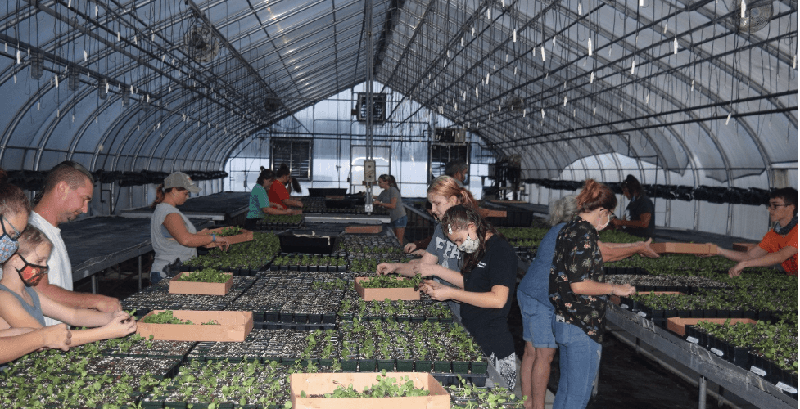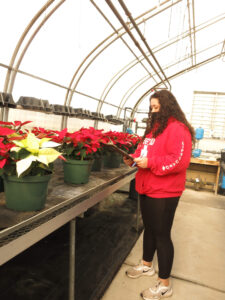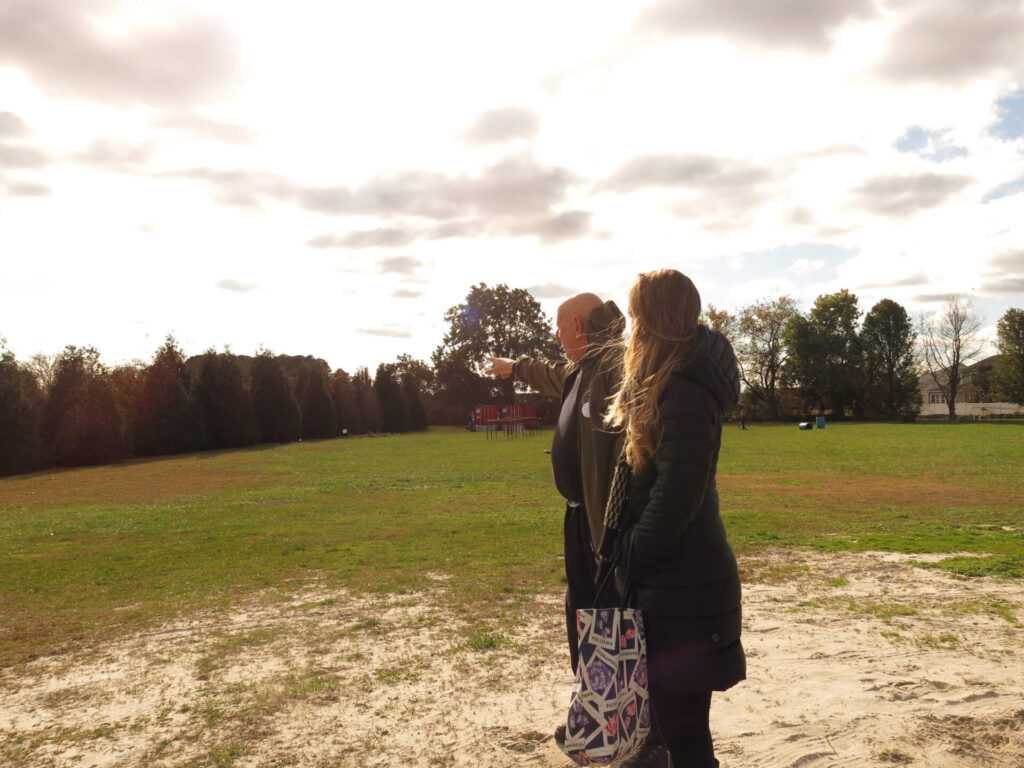One State’s Bet on ‘Green Schools’ to Prep Grads for Future $1.4 Billion Industry

It looks a lot like Christmas at Parkside High School in Salisbury, with red and white poinsettias lining greenhouse tables and poinsettia flags and holiday wreaths welcoming customers as they pick up plants and gift packages of tea and honey at the student-operated A+ Garden Centre.
Since it opened in 1999 the Centre has become one of the largest school-based businesses in the country.
Students do all the work, from planting to sales to online promotions for more than 100,000 vegetable, herb, poinsettia and perennial plants.
Those sales help sustain the business and instructional initiatives, most importantly Parkside’s horticulture program, which is also supported by community partners who provide resources and in-kind services.
The Career & Technical Education Program classes are largely female — only one male student enrolled this calendar year — and average around 46 students, two-thirds of whom are bused each day from other Wicomico County Public schools.
At the program’s helm is Jerry Kelley, who grew up in his family’s landscape business in Montgomery County in the 1980s, then went to work in the fashion industry as a buyer and manager for several decades. In retirement, he turned to education, taking classes and working as a substitute teacher until his dream job as horticulture instructor at Parkside opened up in 2015.
“It’s a way of giving back,” he said. “Our mission is really just to provide opportunities for students to get involved in every aspect of the green industry, of the environment, where they feel comfortable, and where they have a path, where they have a passion.”
Poinsettias on sale, research in progress
Poinsettias are on sale for the holidays.

Clipboard in hand, Abbie Murphy, a 15-year-old in the program, checks each one, like she has done regularly since September to gather data on how the plants, grown from plugs, fare in different types of light.
She and partner Reef Ward, will present their research findings to FFA, formerly known as Future Farmers of America, in the Spring 2022 Plant Science Competition.
Murphy said her horticulture classes are a welcome change from what she calls “book work” during her school day.
“I really like that you get to be out outside. I feel like I’m more myself and just enjoying life more when we’re out here in the greenhouses doing things like this,” Murphy said.
In 2021, classmates Allison Tribeck and Zoey Bradley won first place in Maryland and ranked 10th nationally in the FAA competition for their study on mums. In addition to the research, Tribeck has taken over many roles in the A+ Centre, from cashier to gardener to citizen scientist, and excelled at them all. The experience has made her a better writer and a better student overall, she said.
“In other classes [learning] is about memorization. Here … it gets your gears turning. It makes you think,” Tribeck said.
Kelley begins each school year by handing out the United Nations Sustainable Development Goals, a series of aspirations that the UN calls “a blueprint to achieve a better and more sustainable future for all.” He asks students to write a short essay about which one of those goals means the most to them.
How students respond reveals their interests, which Kelley then weaves into assignments and research projects in the curriculum, he said.
Tribeck’s essay explored “climate change and how it affects food miles [transport to market], as well as clean and renewable and affordable energy,” she said.
Over three years either in single- or double-class periods, students juggle their required courses for graduation at their home schools with those at Parkside in plant and environmental science, landscape design and management. The program culminates with a rigorous exam and certificate as a professional horticulturist from the Maryland Nursery, Landscape, and Greenhouse Association. The certification can boost students’ chances of landing a job in the $1.4 billion horticulture industry, according to the trade group.
Kelley said at its core, this vocational track at Parkside is about environmental literacy, which he has seen spread beyond the A+ Centre and its adjacent classroom.
“There’s a willingness to cooperate, [like on] the habitat corridor between the two football fields, an on-going grounds project since 2015.” Students have worked together to add an apiary, bee boxes, bat houses, bird feeders and bird houses, and hundreds of native plants.
In 2017, the area was certified as a Schoolyard Habitat by the National Wildlife Federation.

Green School Certification
Also in 2017, Parkside became a Green School, certified by the non-profit Maryland Association for Environmental and Outdoor Education (MAEOE). The group’s mission aligns closely with state goals, which for more than 40 years have made state education standards and requirements for environmental literacy compulsory.
In 2011 Maryland became the first state in the country to mandate an environmental literacy high school graduation requirement. The Green School Act of 2019 awarded MAEOE a $1.5 million grant, which Executive Director Laura Johnson Collard said will help the organization reach its goal to certify 50% of Maryland’s schools as Green Schools by 2027.
“We’re at 33% this year, or 664 Maryland Schools” she said. “Another 340 schools must meet our core objectives that promote systemic environmental education, student action, and community partnerships to meet that goal,” she adds.
“Our vision is to make all Maryland schools Green Schools, that you have teachers who are environmentally literate, students who are environmentally literate, and you have a community that understands the impact that they have on the environment, that these kids understand their impact and are helping our state to do climate mitigation, to be climate resilient, to help us be prepared,” Collard said.
Such collective action makes a difference. Its most recent progress report finds that during the 2020-21 school year 723,365 pounds of recycled materials, 194,969 gallons of water conserved and 7,350,878 kilowatt-hours of energy conserved, all achieved largely from 70 applicants, including 11 new schools during the COVID pandemic.
Students step up, win awards, recognition
Sara-elah Hoffman, a junior Parkside horticulture student, believes that public policy can have a big impact.
“I’m actually thinking of majoring [in college] in environmental policy, because I believe the biggest way you can make [environmental] change is through the government,” Hoffman said.
The horticulture program, she said, has also given her the leadership skills and confidence to take on a job as volunteer manager of Boundless Community Garden in Salisbury, no small task for the 16-year-old, who spends several hours a week at the site.
“We have 16 beds, with native plants and flowers, and it’s open to the community,” she said.
Her activism got the attention of Salisbury Mayor Jacob Day, and the city’s sustainability director, Alyssa Hastings, who tapped Hoffman to sit on the mayor’s sustainability advisory board. “Youth voices matter” Hastings said. “They are our future, so it’s important that they are a part of the decision-making in the city.”
Hastings brought that message into the classroom congratulating students in the Career and Technology Education’s A+ Garden Centre for their efforts in how they recycle products, conserve water, manage nutrients, and handle waste.
This earned the Centre Salisbury’s Green Business Certification in 2019, which, she tells the students, has been renewed to 2023.
“Sustainable food systems are crucial to a sustainable city,” she said. “Having people and young people entering our community, knowing how to grow their own food, knowing how to produce, whether it’s flowers or agricultural products, it gives us a big leg up to helping grow our local economy, grow our local food economy, and do it in a sustainable way.”
Partnerships, key to success
During this school year, Parkside will be updating its Green School certification, collaborating with the school’s Green Committee on curriculum and grounds projects. The horticulture program has already added a roof top garden, a floating wetland, and pocket meadows, all of which will require a diverse array of hands-on activities, academic research, and partnerships with institutions and its neighbors in Salisbury and beyond.
Kelley said in career technical education, it is partnerships, often difficult to maintain, that can bring about the most profound change, something he documented in his Master’s thesis for a degree in education at the University of Maryland Eastern Shore.
“Local groups like Salisbury’s Ward Museum, Wicomico Environmental Trust, Lower Land Trust, Wicomico Extension and others are integral to everything we do, providing students with role models, resources and expertise,” he said.
This article originally appeared at Maryland Matters.
Get stories like these delivered straight to your inbox. Sign up for The 74 Newsletter

;)